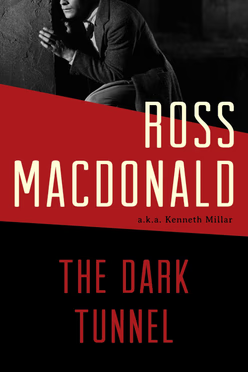The Dark Tunnel

Ross MacDonald’s debut novel sees college professor Robert Branch thwarting a cadre of Nazi spies.
It opens at a Navy recruiting office. The exposition-heavy dialogue disappoints:
“Well, here we go,” he said. “Wish me luck.”
“Like hell I will. You know what I think of your going in the Navy. Anyway, I’m the one that needs the luck.”
“You don’t have to worry, they’ll take you.”
“Maybe,” I said. “The Army turned me down last year.” “That was last year. They’ve given up using Superman as a standard.”
But things pick up as MacDonald sets up a mystery around a Nazi mole within the campus War Board. The plot then piles on a locked-room murder mystery. MacDonald goes through great pains to describe the Rube-Goldberg style setup, but this just leads to confusion:
I stepped around the woman on the floor to look at the window. The lower half was open, a single steel-framed pane about four-feet square that opened at the bottom and swung outward from the top. The top corners of the pane slid down oiled grooves in the upright sashes at the sides when the bottom was pushed out, so that when the window was wide open, it formed a horizontal plane midway in the four-foot square, supported by steel arms. The window was only partly open now. The outswung pane formed an angle of about thirty degrees with the vertical sashes where it met them at the top…
I re-read the above three times and still struggled to form a mental picture. But no worries. Branch is soon fleeing a pair of assassins and the police.
Here MacDonald proves vulnerable to fits of lazy writing:
The two huge steampipes, green-painted, hung before me like twin segments of impossible serpents glowing with impossible energy.
Despite such lapses, this proves the book’s most entertaining section. MacDonald does a great job conveying Branch’s desperation, and the story rumbles along at a frantic pace. Good thing too—lest the reader question the college professor’s Olympic-level physical conditioning. Or how many folks are awake past two a.m.. Or how Branch could forget his gun:
Suddenly, I noticed that I had no gun. I must have left it in the reptile-pit.
Astute readers will suss out the final reveal well before our hero, rendering the story passable but forgettable. Still, MacDonald shows moments of poetic brilliance:
The stars fell down and rattled at the bottom of the sky and the night put on shabby brown clothes.
And hard boiled wit:
I put the lipstick in my pocket in case I should meet a woman, and held my gun cocked for the same reason as I went on.
Enough that I’m willing to give him another shot.
Reading History
- 2022Apr17SunEbook (MysteriousPress.com / Open Road, 2013)
Read over 15 Days
- 3 Apr 20229%
- 7 Apr 202218%
- 9 Apr 202224%
- 11 Apr 202227%
- 12 Apr 202236%
- 13 Apr 202241%
- 14 Apr 202249%
- 15 Apr 202257%
- 16 Apr 202260%
- 17 Apr 2022Finished